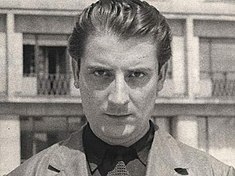
Branko Miljković
You can help expand this article with text translated from the corresponding article in Serbian. (September 2020) Click [show] for important translation instructions.
|
Branko Miljković | |
|---|---|
 | |
| Born | 29 January 1934 |
| Died | 12 February 1961 (aged 27) |
| Resting place | New Cemetery, Belgrade |
| Alma mater | University of Belgrade |
| Occupation | Poet |
| Years active | 1952–1961 |
Branko Miljković (Serbian Cyrillic: Бранко Миљковић; 29 January 1934 – 12 February 1961) was a Serbian poet.[1]

Biography
Miljković was born in Niš to a Serb father Gligorije Miljković, who hails from Gadžin Han, and a Croat mother Marija Brailo, who hails from Trbounje near Drniš.[2][3][4]

He was best known throughout Yugoslavia, the Soviet Union and other countries of the Eastern Bloc for his influential writings. At a time when no one could have foreseen anything but a bright future for the poet, he died prematurely in 1961 at the age of 27. He was found hanging from a tree in Zagreb, today's Croatia. This controversial incident was officially recorded as a suicide.[5]

In his one-line poem "Epitaph", he writes "Ubi me prejaka reč" ("I was killed by a word too strong") almost sensing his premature end of life. During the last years of his life, he published five books of poetry (I Wake Her in Vain, Death against Death, The Origin of Hope, Fire and Nothing, The Shining Blood, criticism, and translations of the French Symbolists and Russian poet Osip Mandelstam. He continues to influence poets to this day.

Legacy
A biopic about Miljković's life and poetry Vatra i ništa ('Fire and Nothing') was produced in 1995. It was written and directed by Marislav Radisavljević, and produced by Ivan Zdravković. Goran Milev played the role of Branko Miljković.[6]

He is sometimes called "the Serbian prince of poetry".[7] In 2024, several of his poems were included in Buenos Aires Poetry n°1, in Serbian, English and Spanish.[8]

Works
- Uzalud je budim, Belgrade, 1957
- Smrću protiv smrti, (co-written with Blažo Šćepanović), Belgrade, 1959
- Vatra i ništa, Belgrade, 1960
- Poreklo nade, Zagreb, 1960
- Krv koja svetli, Belgrade, 1961
References
- ^ Politika (2011-10-02). "Kako je stradao Branko Miljković" (in Serbian). Retrieved 2017-07-24.
- ^ "Branko Miljković – biografija". Najlepša poezija – najbolji pesnici (in Serbian). 27 November 2013. Retrieved 8 August 2021.
- ^ "Branko Miljković: "Jedan nesretan čovjek ne može biti pjesnik"". Bljesak (in Croatian). 29 January 2021. Retrieved 8 August 2021.
- ^ Plavšić, Goran (5 February 2011). "Princ poezije na prokletom tlu". Novosti (in Croatian). Retrieved 8 August 2021.
- ^ Politika (2011-03-10). "Izložba o Branku Miljkoviću" (in Serbian). Retrieved 2017-07-24.
- ^ "Filmsko veče posvećeno Branku Miljkoviću u Domu vojske". Ministry of Defence of Serbia. 2011-12-29. Retrieved 2021-01-26.
- ^ Serbia, RTS, Radio televizija Srbije, Radio Television of. "Бранко Миљковић – принц поезије којег је убила прејака реч". www.rts.rs. Retrieved 2021-02-17.
{{cite web}}: CS1 maint: multiple names: authors list (link) - ^ Passes, Pipa (2024-08-23). "Buenos Aires Poetry n°1 (Nueva Época)". Buenos Aires Poetry (in Spanish). Retrieved 2024-10-03.
External links
- Translated works by Branko Miljković Archived 2017-01-10 at the Wayback Machine
- Biography of Branko Miljković on web site Poetabg (in Serbian)
- Short biography written by Kosta Dimitrijević and published on Poemhunter website
- Short biography on Znanje (in Serbian)
- Works (in Serbian)
- 1934 births
- 1961 suicides
- Serbian people of Croatian descent
- Writers from Niš
- 20th-century Serbian poets
- Serbian male poets
- Suicides by hanging in Yugoslavia
- Suicides by hanging in Croatia
- Death conspiracy theories
- University of Belgrade Faculty of Philosophy alumni
- Burials at Belgrade New Cemetery
- 1961 deaths
See what we do next...
OR
By submitting your email or phone number, you're giving mschf permission to send you email and/or recurring marketing texts. Data rates may apply. Text stop to cancel, help for help.
Success: You're subscribed now !

